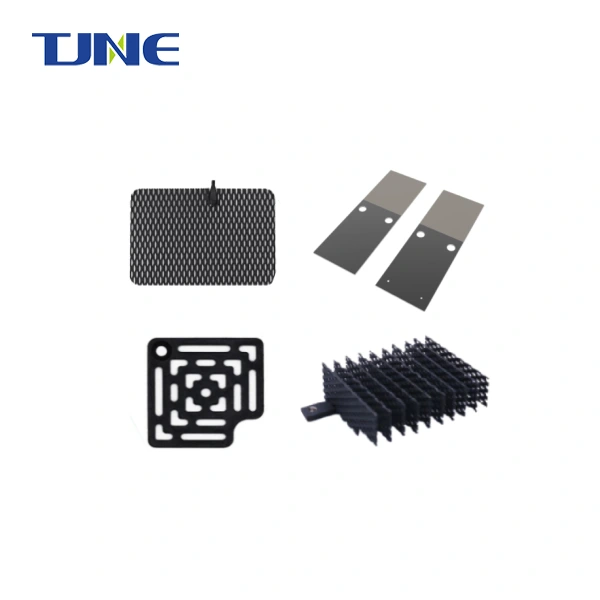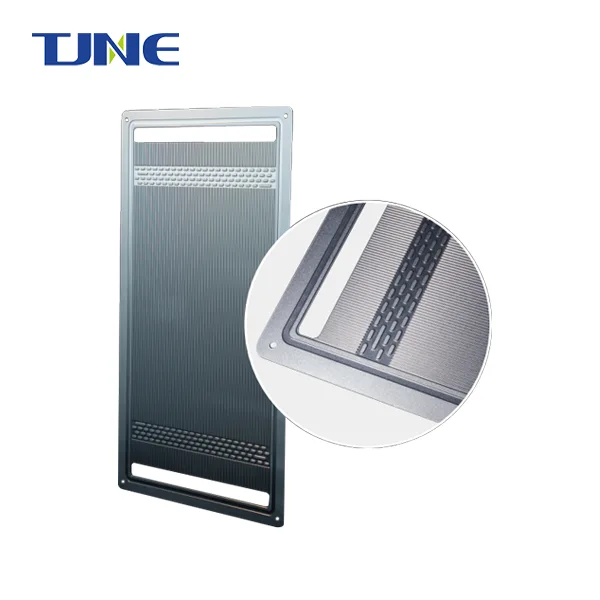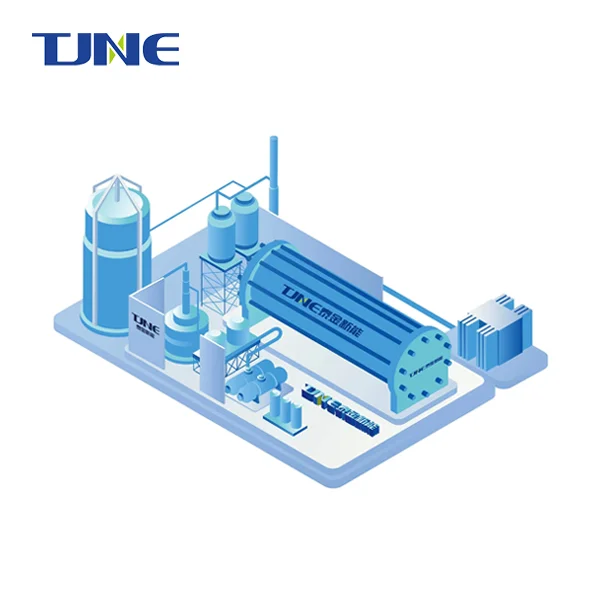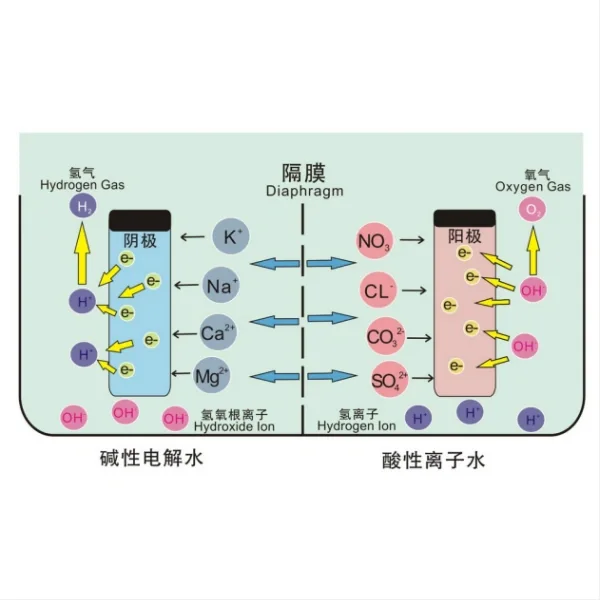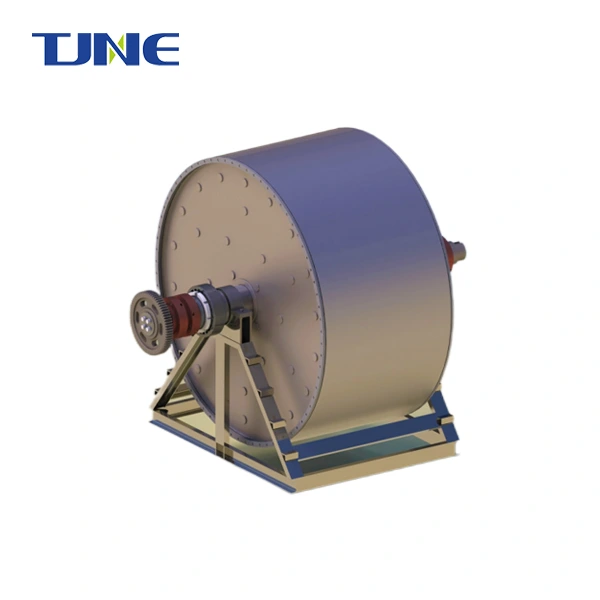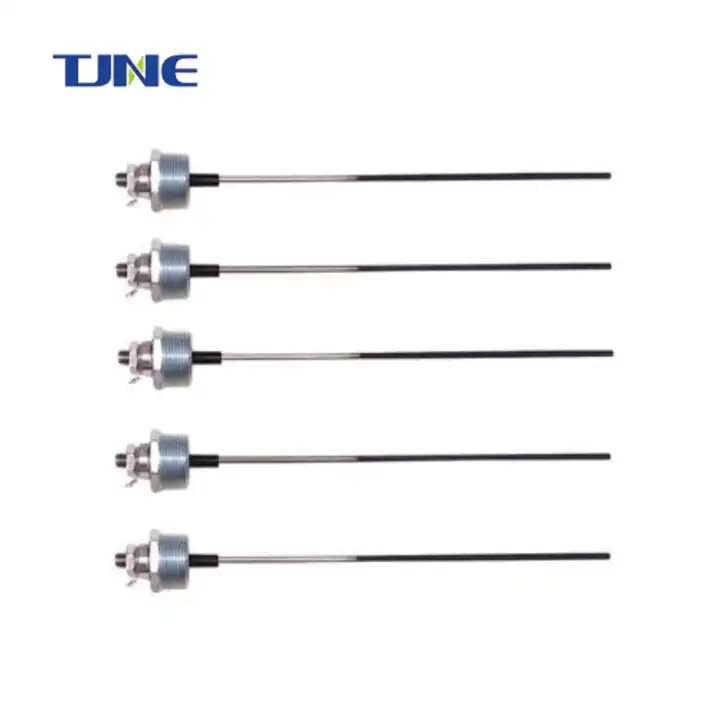- English
- French
- German
- Portuguese
- Spanish
- Russian
- Japanese
- Korean
- Arabic
- Greek
- German
- Turkish
- Italian
- Danish
- Romanian
- Indonesian
- Czech
- Afrikaans
- Swedish
- Polish
- Basque
- Catalan
- Esperanto
- Hindi
- Lao
- Albanian
- Amharic
- Armenian
- Azerbaijani
- Belarusian
- Bengali
- Bosnian
- Bulgarian
- Cebuano
- Chichewa
- Corsican
- Croatian
- Dutch
- Estonian
- Filipino
- Finnish
- Frisian
- Galician
- Georgian
- Gujarati
- Haitian
- Hausa
- Hawaiian
- Hebrew
- Hmong
- Hungarian
- Icelandic
- Igbo
- Javanese
- Kannada
- Kazakh
- Khmer
- Kurdish
- Kyrgyz
- Latin
- Latvian
- Lithuanian
- Luxembou..
- Macedonian
- Malagasy
- Malay
- Malayalam
- Maltese
- Maori
- Marathi
- Mongolian
- Burmese
- Nepali
- Norwegian
- Pashto
- Persian
- Punjabi
- Serbian
- Sesotho
- Sinhala
- Slovak
- Slovenian
- Somali
- Samoan
- Scots Gaelic
- Shona
- Sindhi
- Sundanese
- Swahili
- Tajik
- Tamil
- Telugu
- Thai
- Ukrainian
- Urdu
- Uzbek
- Vietnamese
- Welsh
- Xhosa
- Yiddish
- Yoruba
- Zulu
Polymer Electrolyte Membrane(PEM)Electrolyzers
Design life exceeds 40,000 hours.
Operating current density up to 2 A/cm²; Operating load range 5% to 125%.
The power consumption is as low as 4.3 kW·h/Nm3, and the hydrogen purity can reach 99.99%.
The electrolytic cell adopts modular stacking design, and the modules are double sealed by bolt fastening and sealant to ensure high air tightness. Primarily applied in healthcare, agriculture, electronics and semiconductors, diamond cultivation, hydrogen refueling stations, chemical synthesis, energy storage, and distributed microgrids.
We can provide timely and high-quality equipment debugging and installation equipment globally
Polymer Exchange Membrane (PEM) electrolyzers are advanced electrochemical devices designed for green hydrogen production through the electrolysis of water. They stand out for their high effectiveness, continuity and ease of operation, making them a core technology for the global transition to a low-carbon energy system.
The PEM electrolyzer consists of a polymer exchange membrane (PEM) which enabling proton (H⁺) transfer, two electrodes (anode and cathode). When an electric current is applied, water molecules are split into oxygen gas, protons, and electrons at the anode and protons (H⁺) migrate through the PEM toward the cathode. At the anode, electrons from the external circuit combine with protons to form hydrogen gas (water motes are resolved into hydrogen ions( protons) and oxygen ions. The protons pass through the membrane to the cathode, while the oxygen ions resettle to the anode. At the cathode, the protons combine with electrons to form hydrogen gas (H₂). Then, high-purity hydrogen can be collected from the cathode side.
Technical Advantages
Optimizing Flow Field Structure VS High-Performance Durability Test
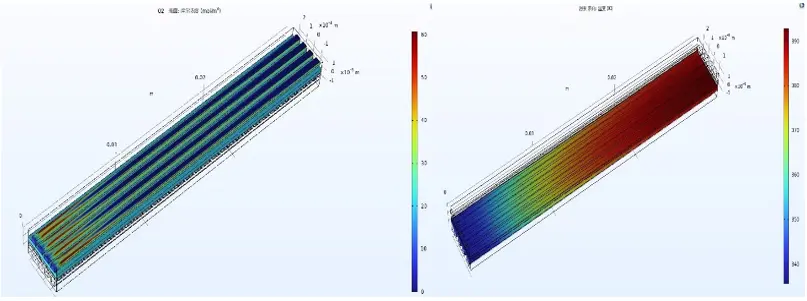
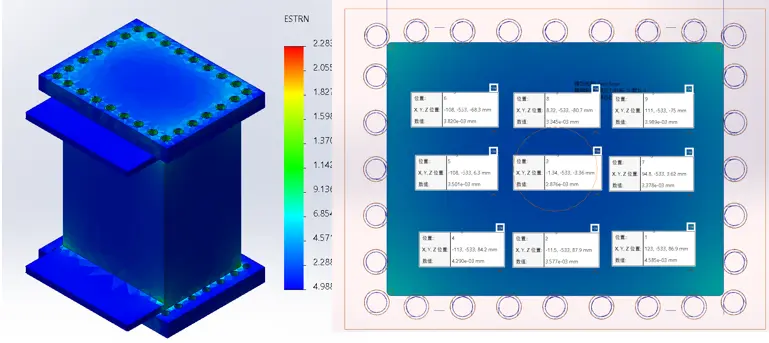
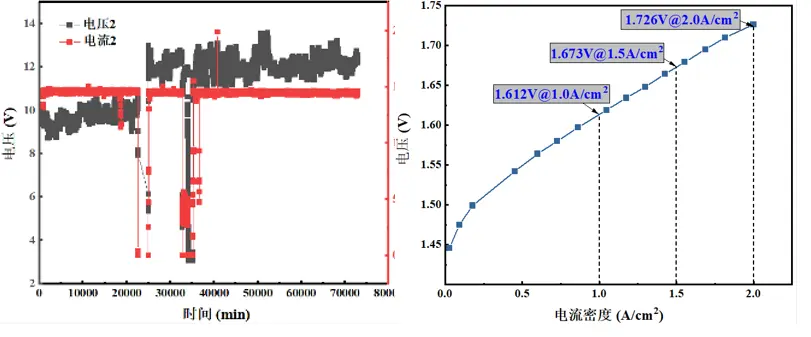
Flow field simulation optimization, PEM electrolytic cell to achieve uniform distribution of electrolyte and gas, significantly improve the electrolysis efficiency, reduce energy consumption, effectively reduce the performance deviation of each electrolysis unit, to ensure the stability of equipment operation and hydrogen production consistency.
The PEM electrolyzer builds a solid barrier for the safe and reliable operation of the equipment by virtue of multiple safety protection designs. In the face of 4 MPa extreme working conditions, the double-channel sealing structure plays a central role. Special sealing materials and precision manufacturing processes are used to strictly control the leakage rate below 0.1 %/h, effectively eliminating the risk of hydrogen leakage and avoiding safety hazards caused by gas leakage.
The polarization curve test verifies that the PEM electrolytic cell has efficient electrochemical reaction performance, and there is no obvious performance attenuation with the durability test. The stable and reliable quality is proved by the data, so that customers are confident in the safety and efficiency of the long-term operation of the equipment.
Operating Support Conditions
For single-tank hydrogen production 200 Nm3/h
| Serial Number | Project | Unit | Technical Parameters |
| 1 | Electrolyzer | ||
| 1.1 | Hydrogen production | Nm3/h | 300 |
| 1.2 | Work pressure | MPag | 3.2 |
| 1.3 | Operating temperature | ℃ | 60 |
| 1.4 | Rated voltage | V(DC) | 300 |
| 1.5 | Rated current | A(DC) | 4400 |
| 1.6 | Number of cells | pcs | 165 |
| 1.7 | DC unit power consumption |
kWh/(Nm3H2) |
≤4.3 |
| 1.8 | Raw water consumption | L/h | 280 |
| 1.9 | Water quality requirement | >18.2MΩ・cm | |
| 1.10 | Electrolyzer structure type | Bipolar filter press type | |
| 1.11 | Polar plate | Platinum-plated titanium | |
| 1.12 | Catalytic layer | Iridium oxide/Platinum-carbon | |
| 1.13 | Electrolyte material | Proton exchange membrane | |
| 1.14 | Insulating and sealing material | PTFE | |
| 1.15 | Electrolyzer weight | kg | 2500 |
| 1.16 | Electrolyzer overall dimensions | mm | 1480×900×1260 |
Independent module design:
Each module is like a standardized ' building block ', which can be flexibly increased or decreased according to the hydrogen production demand, and can easily realize the scale expansion from 500 to 10,000 square meters, which is convenient for expansion.
Convenient installation and maintenance:
Individual modules facilitate easy disassembly and replacement, significantly reducing downtime and maintenance costs.
Compact component layout:
Optimized fluid transfer pathways, enhanced electrolytic efficiency, and improved system stability and reliability to ensure continuous hydrogen production.
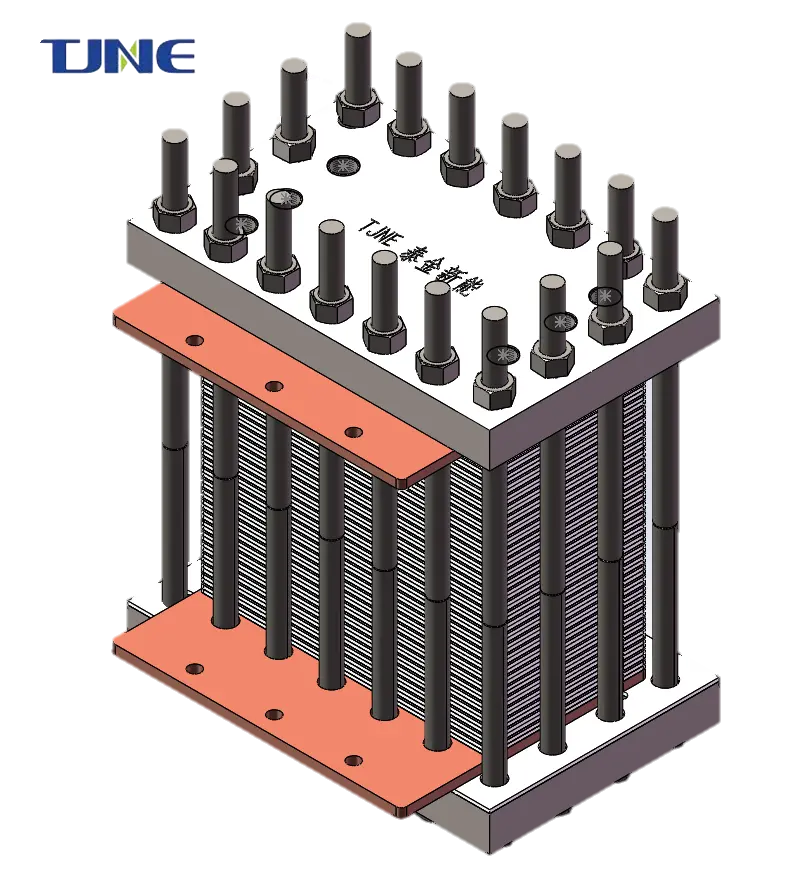
| Electrolyzer Model | TJSP-100-X | |
| Hydrogen Production Capacity Range | Nm3/h | 0.5~5 |
| Length | mm | 205 |
| Width | mm | 130 |
| Electrode Active Area | cm2 | 100 |
| Plate Coating | / | Pt |
| Cell Voltage | V | 1.75 |
| Operating Current | A | 200 |
| Rated Energy Consumption | Nm3/kWh | 4.18 |
| Number of Cells | / | 5~40 |
| Design Life | h | 60000 |
| Hydrogen Production Pressure | MPa | 3.2 |
| Differential Pressure Value | MPa | ≤3.0 |
| Electrolyzer Model | TJSP-400-X | |
| Hydrogen Production Capacity Range | Nm3/h | 5~33 |
| Length | mm | 400 |
| Width | mm | 400 |
| Electrode Active Area | cm2 | 400 |
| Plate Coating | / | Pt |
| Cell Voltage | V | 1.76 |
| Operating Current | A | 1000 |
| Rated Energy Consumption | Nm3/kWh | 4.2 |
| Number of Cells | / | 12~80 |
| Design Life | h | 60000 |
| Hydrogen Production Pressure | MPa | 3.2 |
| Differential Pressure Value | MPa | ≤3.0 |
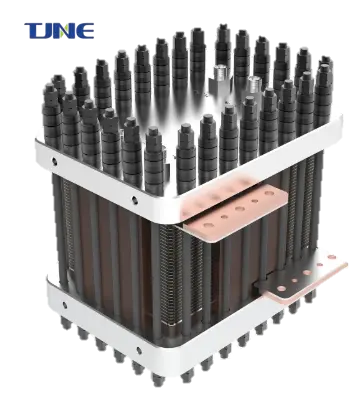
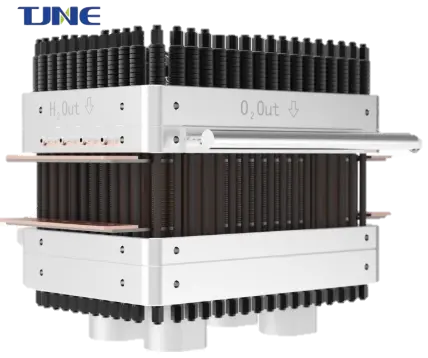
| Electrolyzer Model | TJSP-800-X | |
| Hydrogen Production Capacity Range | Nm3/h | 30~100 |
| Length | mm | 500 |
| Width | mm | 380 |
| Electrode Active Area | cm2 | 800 |
| Plate Coating | / | Pt |
| Cell Voltage | V | 1.8 |
| Operating Current | A | 1600 |
| Rated Energy Consumption | Nm3/kWh | 4.3 |
| Number of Cells | / | 45~150 |
| Design Life | h | 60000 |
| Hydrogen Production Pressure | MPa | 3.2 |
| Differential Pressure Value | MPa | ≤3.0 |
| Electrolyzer Model | TJSP-1600-X | |
| Hydrogen Production Capacity Range | Nm3/h | 100~300 |
| Length | mm | 500 |
| Width | mm | 380 |
| Electrode Active Area | cm2 | 800 |
| Plate Coating | / | Pt |
| Cell Voltage | V | 1.8 |
| Operating Current | A | 1600 |
| Rated Energy Consumption | Nm3/kWh | 4.3 |
| Number of Cells | / | 45~150 |
| Design Life | h | 60000 |
| Hydrogen Production Pressure | MPa | 3.2 |
| Differential Pressure Value | MPa | ≤3.0 |
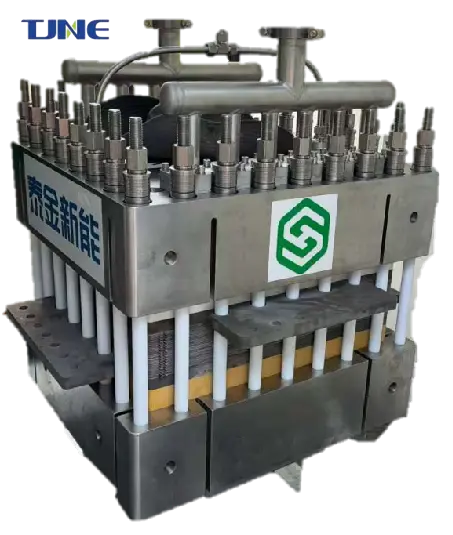
TJNE is a leading manufacturer and supplier of Polymer Electrolyte Membrane (PEM) Electrolyzers. We specialize in providing high-quality products with comprehensive one-stop after-sales services. Our products have undergone rigorous certification and testing, and we ensure fast delivery with secure packaging. For inquiries or if you are interested in our PEM electrolyzers, please contact us at yangbo@tjanode.com







